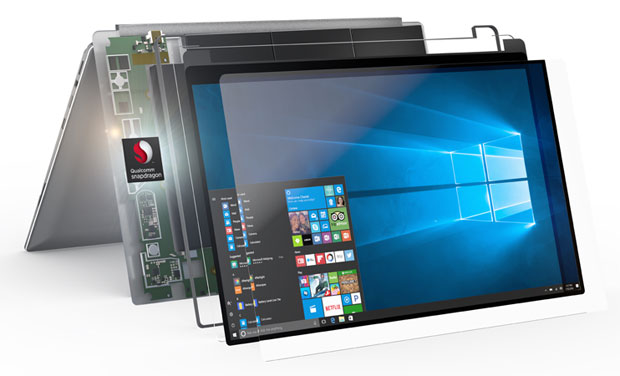
We are coming up to the end of the year, and it's a good time to look forward. Next week, I'll look back and call out my product of the year.
Stepping outside of politics and the obvious war between the Democrats, Republicans and common sense, there is the war between Amazon and Google, which likely will redefine the growth of digital assistants.
There's also the war between Intel and Qualcomm in the personal computing arena. With both Google and Intel behaving foolishly, I'm going to call the battles for Amazon and Qualcomm -- but for very different reasons.
I'll close with my last product of the week, in this case a product class: the recently announced joint Qualcomm Microsoft effort called the "Always-Connected PC" which will result from the Intel/Qualcomm battle. Let's get to it.
Google Is Now Synonymous With Idiot
The latest Amazon vs. Google battle just flared last week. Apparently, because Amazon doesn't want to sell Google's Chromecast TV device or Home voice-activated speaker, Google has cut off access to YouTube for users of Amazon's Fire TV and Echo Show. So, basically, Google is punishing Amazon's customers -- many of whom also are Google's customers -- to force Amazon to do something it doesn't want to do.
I expect that Jeff Bezos got training similar to what I got coming up as an executive, and the rule is that when someone attempts to blackmail you, you always take the "or else." In this case, the "or else" likely is not as bad for Amazon as it is for Google. (By the way, the reason for this, is that if you ever give in to blackmail you are owned by the person who is blackmailing you.)
There is an enormous difference between a retailer not carrying a product and an open Web service provider who lives off ad revenue cutting off huge groups of users. Google makes ad revenue from YouTube regardless of how users access the service. YouTube is a recurring revenue stream, and when it comes to uploaded videos, YouTube basically has a monopoly right now.
Yes, you can go to Bing, but Bing largely pulls off YouTube (which does suggest that Amazon may have an interesting workaround with Microsoft). Amazon, while not as powerful as Google, does have a massive customer base -- and alienating this base could be problematic for Google.
On the other hand, Google, which basically owns search on the Web, has many avenues to go around Amazon or Apple. (Apple Stores don't carry Google products either, for obvious reasons.)
Amazon's likely response is to find an alternative to YouTube. Whether that is blessing Bing, coming up with its own AWS-based video streaming service funded to steal market share from Google, or finding another partner to close the gap, it likely would be bad for YouTube.
Google's action is not only an example of classic abuse of power, it is incredibly stupid. The industry rule is that while you certainly can attack a competitor, you never go after common customers to force an outcome. Doing so puts too much focus on the excessive market power you have, raises up competitors, and hurts revenue both in the short and long terms.
So, in this, I expect Amazon will prevail for no other reason that it hasn't, at least in this instance, behave stupidly and turned customers into cannon fodder. If Google expands this and cuts joint Amazon/Google customers form search, I expect that Google even more quickly will discover that misusing monopoly power ends badly.
Now We Know What the 'I' in Intel Stands For...
Over the years, many firms have tried to unseat Intel -- from IBM to AMD. The company's close focus on technology and massive dominance always has allowed it to prevail. However, when Intel went after the smartphone market and failed, it opened a very different opportunity for failure.
My own view was that Qualcomm owned the smartphone market and Intel owned PCs. The battleground would have been tablets, and the company that prevailed with tablets likely would use that success to challenge the respective competitor in either PCs or smartphones.
Rather than focusing on tablets, Intel prematurely went after smartphones -- but without the tablet foundation, it was routed. Smartphones grew up to make tablets largely redundant, and that allowed Qualcomm to move on to PCs.
I'm at Qualcomm's massive Hawaiian event with press and analysts, where the company is showcasing why it's better than Intel in a broad sense, as it rolls out its Always-Connected PC platform.
During this same window, Intel has made massive cuts to its own media outreach and analyst support. What this means is that Qualcomm has moved in on Intel's protected space, with Microsoft's support, almost unchallenged.
Granted, its attack is focused on lifting the modem over the processor as the most important part of the PC, but with the massive expansion of cloud services, that really isn't much of a stretch.
AMD, which has been performing very well strategically of late, showed up in support of this. Its future products will be higher-performing alternatives to the pure Qualcomm offerings, allowing the companies to bifurcate the most lucrative PC segment.
In addition, the Always-Connected PC is an ideal mobile accessory to those of us with gaming or workstation machines at home, and AMD's Threadripper is fast becoming the favorite of these groups. This suggests, with AMD's help, that Intel could be trivialized in its own market.
I'm again reminded of the Ballad of the Noob, in which a new player, just by being persistent, wins against a very advanced player because the advanced player's eye strays off the ball.
Now there is a wild card in the Apple vs. Qualcomm litigation. However, given that Apple has signaled it eventually wants to take its PCs to ARM and simplify its hardware offerings, that means that even if Apple should prevail, the outcome for Intel will, be dire unless something changes.
One final thought: During the event I'm at, Qualcomm launched its 845 part, driving home the point that should Intel ever fall behind Qualcomm, it won't be able to catch up. We could be seeing the beginning of the end for that company.
Wrapping Up
Google has a very young executive team, and if there is any lesson that we should learn from 2017 it is that we need to train executives better to avoid abuse of power and encourage thinking strategically. Google rarely does either, and this fight it is slated to lose with Amazon is likely to be yet one more case in point.
For Intel and Qualcomm, it really comes down to Intel behaving tactically and not building up a strategic base before going after Qualcomm. Further, Qualcomm and AMD have been far more strategic and moved against Intel in a far more methodical fashion.
Intel must keep it fabs populated, and it is unlikely its automotive or drone efforts (which aren't operating together like Nvidia's are) will get to volume much before 2020, if at all, to make up for the likely sales losses in 2018.
In both cases, I expect these battles will become textbook examples of reasons not to abuse power, and why it is so important to think and operate strategically and methodically.
In the end, I expect 2018 to be a good year for Amazon, AMD and Qualcomm -- but Google and especially Intel, not so much.
OK this "Always-Connected PC" is a 2-in-1 laptop offering due out next year from Asus, HP and Lenovo.
It promises 20-plus hours of battery life and 30 or so days of standby time, and it is both lighter and more secure than whatever else you might have chosen.
A laptop that would make a smartphone jealous is something I didn't expect to see in my lifetime, and this has full Windows 10 support. What makes it more secure is that WAN (cellphone) connections generally are more secure than WiFi connections, thanks to the number of rogue or compromised WiFi access points.

Upcoming 'Always Connected PC'
So, unlike a typical laptop -- which requires you to wait until it comes out of sleep or hibernation, then search for a wireless connection and sweat over whether it is a real one rather than a hostile one -- this one starts and connects instantly.
This device is likely best for folks who work like I do, who have a desktop machine at home or in the office for heavy work but want something you don't have to plug in to use for writing, communicating, and watching movies and TV.
If you want more mobile performance, you likely would prefer the AMD Ryzen/Radeon always-connected option. You'll drop battery life and instant on functionality, but you'll get the performance you and instant connections.
Be aware that the device uses emulation, so applications that write to hardware (like most high-end games) won't work -- but then this doesn't have enough performance for high-end games anyway. Personally, if I'm playing a title like that, I want a big monitor and a desktop system.
In the end, this is the first iteration of a laptop with battery life that will make a smartphone jealous; is light, really light; costs between US$600 and $900 (like an iPad Pro); and is one of the sexiest classes of products we've yet seen. They had me at 20 hours of battery life -- and as a result, the Always-Connected PC, due out next year, is my product of the week.
No comments:
Post a Comment